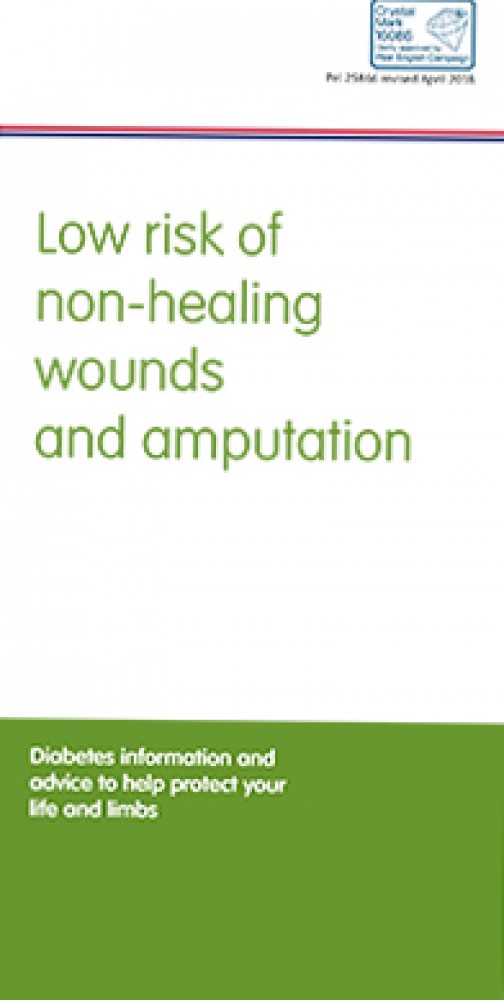|
Accessibility advice:
|
Why is diabetes a risk to your feet?
Diabetes is a lifelong condition which can cause life-and-limb-threatening problems. Some of these problems can occur because the nerves and blood vessels, including those supplying your legs and feet, are damaged. This can change:
- the feeling in your feet (peripheral neuropathy); and
- the circulation in your feet (ischaemia).
These changes can be very gradual and you may not notice them. This is why it is essential you have your feet checked (screened) every year by a suitably trained health-care worker.
What is my foot score and what does it mean?
Your foot check has shown that you do not have nerve or blood vessel damage at present and you are currently at a low risk of developing non-healing foot wounds that are due to your diabetes. The development of foot wounds in people with diabetes is serious as they are linked to an increased risk of heart attacks, strokes, amputations of the foot or leg and early death.
Controlling your diabetes, cholesterol and blood pressure, stopping smoking, increasing cardiovascular exercise and controlling your weight helps to reduce the risk of these life-and limb-threatening problems.
Note: You may be at further risk of cardiovascular problems if you have a family history of heart disease. As your feet are currently at low risk, you can continue to carry out your own general foot care unless you develop a new foot problem.
If you follow the advice and information in this leaflet, it will help you to take care of your feet between your yearly foot checks. This will help you to reduce the risk of developing life-and limb-threatening problems.
What should I do if I have a concern or problem with my feet?
You should check your feet every day for any blisters, breaks in the skin, pain or any signs of infection such as swelling, heat or redness.
|
If you develop any of the following problems, it is important that you contact your Multi-disciplinary Foot Care Team, local Podiatry Department or GP for advice as soon as possible (within 24 hours).
|
What can I do to reduce my risk of developing problems?
You should wash your feet every day in warm water and with a mild soap. Rinse them thoroughly and dry them carefully, especially between the toes. Do not soak your feet as this can damage your skin.
Check your feet every day
You should check your feet every day for any blisters, breaks in the skin, pain or any signs of infection such as swelling, heat or redness. If you cannot do this yourself, ask your partner or carer to help you.
Badly-fitting footwear
Badly-fitting shoes are a common cause of irritation or damage to feet. The professional who screened your feet will give you an advice leaflet about footwear.
Wash your feet every day
You should wash your feet every day in warm water and with mild soap. Rinse them thoroughly and dry them carefully, especially between the toes. Do not soak your feet as this can damage your skin.
Moisturise your feet every day
If your skin is dry, apply a moisturising cream, avoiding the areas between your toes.
Toenail care
Cut or file your toenails regularly, following the curve of the end of your toe. Use a nail file to make sure that there are no sharp edges which could press into the next toe. Do not cut down the sides of your nails as you may create a ‘spike’ of nail which could result in an ingrown toenail.
Socks, stockings and tights
Change your socks, stockings or tights regularly. They should not have bulky seams and the tops should not be elasticated.
Check your shoes
Check the bottom of your shoes before putting them on to make sure that nothing sharp such as a pin, nail or glass has pierced the outer sole. Also, run your hand inside each shoe to check that no small objects such as small stones have fallen in.
Over-the-counter corn remedies
Do not use over-the-counter corn remedies. They are not recommended for anyone with diabetes as they can be highly dangerous and can lead to new wounds and infections.
Appointments
It is important that you attend your yearly screening appointment as well as all of your regular diabetes review appointments. This reduces the risk of problems developing.
Note: At the very least, you should have a diabetes review from your GP every year. Download our leaflet on Low risk of non-healing wounds and amputation
Download our leaflet on Low risk of non-healing wounds and amputation
Note:
This series of information leaflets for people with diabetes was developed, approved and ratified by the following organisations:
Association of British Clinical Diabetologists, British Association of Prosthetists and Orthotists, The College of Podiatry, Diabetes UK, Diabetes Inpatient Specialist Nurses UK Group, Foot In Diabetes UK, Diabetes Foot Network Wales, Primary Care Diabetes Society, Royal College of Nursing and Scottish Diabetes Foot Action Group.
